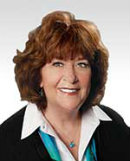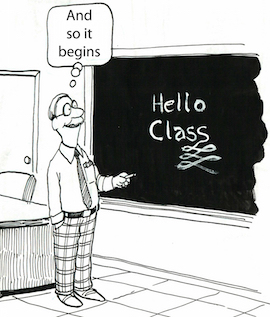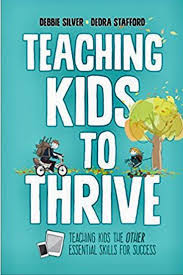Should You Become a Middle School Teacher?
 By Debbie Silver, Ed.D.
By Debbie Silver, Ed.D.
I didn’t actually choose to teach middle school. It chose me. I’ve taught at various grade levels, and I enjoyed all of them, but when I first taught at the middle level, something inside me clicked. These were my people!
Middle school kids are old enough to get subtle humor, young enough to retain their idealism, and just the right age for exploring straightforward questions about themselves and the world.
I was so enthusiastic about teaching middle school methods at the university level that students who had chosen other grade levels would often ask, “Do you think I ought to switch to teaching middle school?” Not necessarily. Just like I don’t believe that everyone who considers teaching as a profession should be a teacher, I do not believe that every teacher is cut out to work at the middle level.
If you’re thinking of pursuing (or switching to) a middle school teaching job, you might find this article helpful. Teaching young adolescents is one of the most rewarding and challenging of all grade levels, and it takes a certain kind of educator to work with middle level learners.
Lost in a sea of wannabes, middle schoolers are desperately trying to figure out who they are as young humans. Their behavior can fluctuate from childlike to teenage (and back) in a matter of minutes. They can be awkward, silly, sullen, self-absorbed, rude, overly sensitive, and clueless. They can also be graceful, funny, warm, altruistic, kind, perceptive, and intuitive.
Students of all ages are, of course, diverse, and successful teachers are likewise dissimilar in various ways. That’s a good thing. While lists for essential teacher qualities abound, these are the three questions I particularly want to ask middle school teacher candidates:
Do people view you as a bit quirky?
The best middle level teachers I know are individuals who have an unusual bent. They find joy in being unorthodox and experimental. Whether they are a tad zany or just have uncommon interests, people who are rather unconventional seem to appeal to students in grades 5-8.
 Individuals with a particular passion (about their subject or another area of interest) can inspire student curiosity. They act as models for engaging in specific pursuits as well as encouraging students to follow their own dreams and desires. Avant-garde teachers can open a whole new world of thinking to young adolescents.
Individuals with a particular passion (about their subject or another area of interest) can inspire student curiosity. They act as models for engaging in specific pursuits as well as encouraging students to follow their own dreams and desires. Avant-garde teachers can open a whole new world of thinking to young adolescents.
Quirky people are generally more accepting of the idiosyncratic behavior of others, and therefore they understand and are more tolerant of the offbeat conduct of young adolescents. Middle schoolers have a unique sense of humor, and they need teachers who are in tune with what kids that age find funny and what they do not.
Teachers with an innovative approach to learning are more able to engage students, and their sense of enthusiasm provides an added spark for participation. They serve as role models for kids who often feel that they, too, “march to the beat of a different drummer.”
So basically, if I am recruiting teachers for the middle grades, I look for adults who have not forgotten what it’s like to think like a middle schooler.
How flexible are you?
Middle school is a time many students seriously begin to question authority. While students this age need structure and boundaries, they also best respond to an adult who is willing to explore and explain the why’s of rules and procedures. Successful middle school teachers lead gently and temper consistency with common sense.
 More than with any other grades, middle level teachers need to work with the dynamic shifts in their students’ moods, attention levels, and physical transformations. Teachers of this age group need to be able to sense underlying currents in the classroom and respond in developmentally appropriate ways. (An example from my own life: students upset by a recent school bus accident may need some time to debrief and express their feelings rather than jumping right into the next unit of study.)
More than with any other grades, middle level teachers need to work with the dynamic shifts in their students’ moods, attention levels, and physical transformations. Teachers of this age group need to be able to sense underlying currents in the classroom and respond in developmentally appropriate ways. (An example from my own life: students upset by a recent school bus accident may need some time to debrief and express their feelings rather than jumping right into the next unit of study.)
Additionally, most middle schools require that teachers work in teams, so they have to be willing to collaborate and cooperate with other educators. Middle school is not for teachers who need a rigid schedule, who prefer to work in isolation, or who don’t like surprises.
In prospective middle teacher candidates, I look for people who think fast on their feet, who can “go with the flow,” and who are able to think long-term rather than just short-term about what is best for their students. Being able to bend and adapt while keeping the end in mind is a definite plus when working at the middle level.
Do you have a strong sense of self?
Self-efficacy is a requisite condition for effective teaching at any level. The belief that one can affect change is a fundamental conviction for every successful educator. For middle level educators it is even more imperative to maintain a sense of what can be controlled and what cannot be controlled.
 By the time students reach the middle grades, they have internalized many significant perceptions about themselves as learners. As a class they manifest disparate stages of accomplishment. Teachers of middle grades have the challenge of determining the varying capabilities of their learners as well as designing tasks that ensure every student gets a reasonable chance at success. These teachers have to believe not only that this is possible but also that they have the ability to do it.
By the time students reach the middle grades, they have internalized many significant perceptions about themselves as learners. As a class they manifest disparate stages of accomplishment. Teachers of middle grades have the challenge of determining the varying capabilities of their learners as well as designing tasks that ensure every student gets a reasonable chance at success. These teachers have to believe not only that this is possible but also that they have the ability to do it.
Middle school teachers need a strong sense of self as they deal with young adolescents who sometimes challenge their authority, question their competency, and doubt their integrity. Middle level learners can occasionally be hateful and rude, and it takes a self-confident teacher to maintain a sense of calm while dealing equitably with snarky students. Only the most self-assured are able to use self-effacing humor to diffuse disrespectful behavior.
The best middle grades teachers are confident in themselves as classroom managers, as instructional coaches, and as assessors. They realize they may not have all the answers, but they feel certain they can find out what they need to know. I want to ask potential middle level educators, “What things about your classroom are you able to change, what things are you not able to change, and how will you deal with the things you cannot alter?”

To sum it up, while I think there are many paths to becoming an effective middle level educator, I believe there are essential qualities that are evidenced by those who are best suited to teach at this level. Teaching middle graders is not for everyone, but for those who feel the call, it’s the greatest job in education.
So, what do you think it takes to be an effective middle school teacher? Do you think it’s a job for everyone? What essential qualities do you think it takes to be a successful in the middle? I’d love to hear what other middle level educators think!
_____________________
 Dr. Debbie Silver is a learning consultant and humorist with over 30 years of experience as a teacher, staff development facilitator, and university professor. As a middle grades classroom teacher, Debbie won numerous awards including the 1990 Louisiana Teacher of the Year award. She speaks worldwide on issues involving education and is a passionate advocate for students and teachers. She is the author and co-author of four bestselling books, including Deliberate Optimism: Reclaiming the Joy in Teaching. and her most recent (with Dedra Stafford) Teaching Kids to Thrive: Essential Skills for Success.
Dr. Debbie Silver is a learning consultant and humorist with over 30 years of experience as a teacher, staff development facilitator, and university professor. As a middle grades classroom teacher, Debbie won numerous awards including the 1990 Louisiana Teacher of the Year award. She speaks worldwide on issues involving education and is a passionate advocate for students and teachers. She is the author and co-author of four bestselling books, including Deliberate Optimism: Reclaiming the Joy in Teaching. and her most recent (with Dedra Stafford) Teaching Kids to Thrive: Essential Skills for Success.


































I, too, teach middle school having spent the last 8 years with 6th graders exclusively. This is my second career (35 years in law; what a difference!) and I love the experience. What you say is so true; not everyone is cut out to be a middle school teacher, especially in 6th grade. Also, having raised 3 kids, the experience has been helpful as well.
Thanks for your comment, Gary. I agree that raising your own middle schoolers can give you added insight into your students (and visa versa). Welcome to the middle!!
I absolutely love this article. I teach 6-8th science and never in my life did I think I would enjoy teaching middle school. I’m in my early 30s and these kids always keep me smiling. I admit, I am quirkier than most, but like you said, you HAVE TO BE!
One of the best ways to manage a classroom full of middle school students is to take the time to listen to them. I love listening to all of their stories and being able to transfer their life experiences into my own teaching. Believe me, middle school students have SO MANY stories!
I always thought I wanted to teach high school and the higher sciences, but I just ended my 5th year in middle school and am not sure if I will ever leave this age group. They always keep the day interesting and somehow find a way to get me to laugh! .
Hi Deb
Awesome article and so right on target. This should be required reading for every school board member, central office administrator and school based administrator. And every teacher preparation professor so we get the right teachers where they need to be.
Hi Ken!
Thanks for the affirmation! I totally agree with you that we need to do a better job of getting teachers into places that maximize their best skills and suit their dispositional strengths. Schools systems need to focus on helping teachers find a “best fit” and make sure they create opportunities for teachers to explore different areas.
Oh Amanda, welcome to our ranks!! It is so great to hear from teachers who truly GET it! Thankfully folks like you and Gary have found a place at middle level!!
I have been teaching middle school art since 2000… i completely agree with your article. I had never considered this level during college and even student teaching. I only considered elementary and high school; but, the first full time job i got was at a middle school (where i am to this day). I LOVE this age. I believe our discipline comes second to teaching character, building self-esteem, shaping ideas and cultivating creativity. The age, as you said, is in-between…old enough to understand/absorb concepts, yet innocent/unspoiled enough to be open-minded. I had the chance, for a few years, to teach in both high school and middle school (i am back to middle school, but lucky enough to be in both of the middle schools in my district)…it was completely different. The middle schooler is special, yet fragile… and, although can be very challenging, i believe is the most rewarding age to educate.
I concur wholeheartedly. I teach 6th grade humanities (this is my 9th year) after 35 years in the law. Never have I felt such a reward as I feel when I see my students engaged in our topics and offering their well thought out opinions during our class discussions, debates, and q and a sessions.
It’s so affirming to hear from teachers like you who love what they do! I know you are a blessing to your students, and I’m so thankful you found your place as a middle level educator. Like you, I can’t imagine a better job!